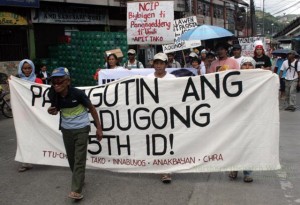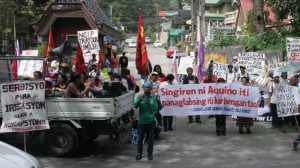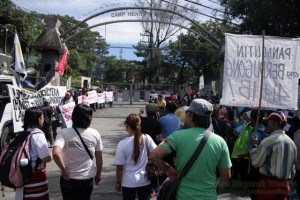Cordi elders lead protest vs rights violations
By ARTHUR L. ALLAD-IW and ALDWIN QUITASOLwww.nordis.net
BAGUIO CITY — Cordillera elders in their indigenous attire, where men wear their wanes (loin cloth) and the women in their tapis (wrap-around skirt) joined at least 500 protesters from various Cordillera villages and rallied at the regional offices of the government agencies based here to demand a stop to the exploitation of their ancestral homeland and the pull out of military troops from their villages.

SUMIKAD
KORDILYERA. Activists march from the regional office of the National
Commission on Indigenous Peoples (NCIP) towards the regional office of
the Department of Agriculture (DA). Photo by Rocky Ngalob
These projects, they claimed, are coupled with military deployment, particularly in areas where there is strong opposition. Military presence they said led to various human rights violations, on their collective and individual rights.
Cordillera Peoples Alliance Secretary General Abigail Bengwayan-Anongos said the activity is dubbed Sumikad Kordilyera (Sumikad literally means to stand up for your rights) as a way of addressing the present situation of development aggression in the region. Development aggression occurs when the natural resources of the region are exploited by corporate interests at the expense of the already marginalized the indigenous people because such projects undermines their interests and welfare.
To facilitate development aggression, military troops are deployed in communities where these projects are to be implemented as designed under Oplan Bayanihan, the military policy of the present Aquino administration.
According to an elder, sumikad is an indigenous practice where oppressed people stand up against oppression. He pointed out that they need to stand up for the protection of their communities and children as the state oppresses them through projects that never benefited them as a people. He invoked that sumikad had been a time immemorial practice, like what their ancestors did in fighting Spanish colonizers, who tried to penetrate the interior Cordillera region.
The protesters rallied infront several regional offices of national government agencies to raise their opposition on government projects and policies they consider against their interests.
At the regional office of the Department of Agriculture, farmers raised that the liberation of the agricultural industry and the membership of the Philippines to the ASEAN Free Trade Association would be detrimental to the country’s agriculture.

Peasants led by Apit Tako held a picket at the regional office of the Department of Agriculture (DA). Photo by Rocky Ngalob
CPA data show that there are 88 hydro-projects, eight geothermal projects, and a windmill energy project are spread through out the region. Proponents of these said projects are mostly big foreign corporations, including Chevron.
With the liberalized mining industry, 67% of the region’s 1,829,369 hectare total land area is covered by various mining methods, according to the data from the regional office of Mines and Geosciences Bureau.
Anongos accused the National Commission on Indigenous Peoples (NCIP) of manipulating the free, prior and informed consent (FPIC) to facilitate the entry of these mining and energy projects. She added that military troops terrorize villages where there is strong opposition to these projects.
Joseph Bagsao of the Cordillera Elders’ Alliance (CEA) said IP communities are living in fear when military troops encamp within their territories because of various human rights violations government soldiers commit against them. He said that in their experience, government soldiers will go to villages where people are actively opposing destructive development projects to intimidate and harass them to ensure that they will give their consent.
At the gates of Camp Henry Allen, the Cordillera Human Rights Alliance (CHRA) raised that the military operations of 41st IB soldiers in Abra did not only terrorize the communities but barred them from attending to their sources of livelihood such as their farms and fields. The human rights group cited the cases of the Ligiws; Licuben, father and sons Fermin and Eddie who were allegedly murdered by the 41st IB soldiers in April.

500
strong activists from the different Cordillera provinces held a protest
action at the gates of Camp Henry Allen on October 20. Photo by Noel
Godinez
Cynthia Dacanay-Jaramillo demanded justice for the torture and desecration of the her husband’s remains adding that erring governemtn soldiers should be held accountable. She said the autopsy report of the National Bureau of Investigation (NBI) clearly showed that government troopers mistreated her husband. She is the wife of Arnold Jarmillo, one of the NPA rebels killed in the September military operation of the 41st in Lacub, Abra.
She said the killing of her husband is a violation of international humanitarian law. The case of her husband and other alleged NPAs, including two civilians, killed on September in Lacub, Abra by the 41st IB is now the subject of a legislative inquiry in the Congress.
At the office of the Regional Development Council here, the ralliest criticized House Bill 5595 that seeks to establish an autonomous Cordillera region.
Anongos said the House Bill being peddled by politicians in the region does not embody the aspirations of Cordillera people for a genuine autonomy as it failed to address the recognition of the indigenous peoples rights to own and control their land and resources.
She urged Cordillerans to heighten the struggle to protect their ancestral domain and push for genuine regional autonomy. # nordis.net
No comments:
Post a Comment